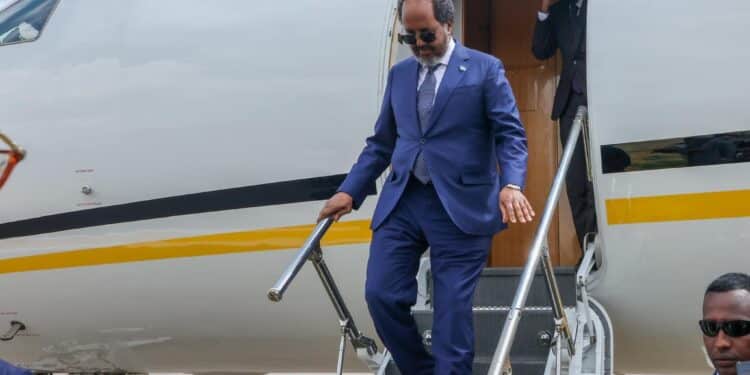Mogadishu, SOMALIA – The Federal Republic of Somalia has issued a stern condemnation of Ethiopia, accusing its neighbor of engaging in a “provocative attempt” to exclude the Somali President’s delegation from the ongoing 2024 African Union (AU) Summit in Addis Ababa. This incident, detailed in a press release from Somalia’s Ministry of Foreign Affairs and International Cooperation, marks a significant escalation in tensions between the two nations, underscoring a growing concern over the stability and unity within the African Union’s member states. This provocative attempt seems to be rooted in Ethiopia’s upset over Somalia’s refusal to accept the controversial MoU, where Ethiopia promised to recognize Somaliland in exchange for sea access.
The Somali government’s press statement characterizes Ethiopia’s actions as a grave violation of both diplomatic norms and international protocols, going as far as to question Ethiopia’s role and responsibilities as the host nation for the AU headquarters. According to the Somali government, such conduct tarnishes Ethiopia’s privileged position, prompting calls for the African Union to reconsider its headquarters’ location should Ethiopia fail in its obligations.
This development is particularly alarming, given the intricate web of political dynamics in the Horn of Africa—a region already beset by various degrees of unrest and tension. The Somali government’s demand for a “credible and independent investigation” into the incident by the AU not only highlights the seriousness with which it views the matter but also sets the stage for a potentially contentious debate on the efficacy of the African Union’s mechanisms for conflict resolution.
The Silence from Ethiopia and Regional Implications
As of this writing, the Ethiopian government’s silence in response to the Somali statement has been deafening. This lack of public engagement raises questions about the future of Ethio-Somali relations and the broader implications for regional stability and cooperation. The Horn of Africa, with its strategic geopolitical position and complex socio-political landscape, stands at a crossroads, with the potential outcome of this dispute likely to influence the direction of regional alliances and the African Union’s role in fostering unity and peace among its members.
The tensions between Somalia and Ethiopia are not solely about the AU Summit incident but are symptomatic of deeper, underlying issues, including historical grievances and geopolitical rivalries. The controversial MoU between Ethiopia and Somaliland, and Ethiopia’s apparent retaliation for Somalia’s refusal to accept it, exemplify these complexities. This incident could exacerbate existing animosities, impacting bilateral relations and potentially affecting cooperation on security and economic development in the region.
Furthermore, the situation tests the African Union’s capacity to manage internal conflicts among its member states. The effectiveness of the AU’s conflict resolution mechanisms is crucial for maintaining unity and ensuring that the continent can collectively address challenges ranging from security to economic development. The outcome of this dispute may serve as a litmus test for the AU’s role and effectiveness in navigating intra-African diplomacy.
Implications for African Unity and Stability
The rift between Somalia and Ethiopia over the AU Summit incident, compounded by the MoU with Somaliland, is more than a diplomatic spat; it reflects broader challenges facing African unity and cooperation. The AU’s response to this incident, and its ability to mediate and resolve such disputes, will be closely watched by the international community and member states alike. A decisive and fair handling of the situation could reinforce the AU’s position as a central pillar in the promotion of African unity, peace, and stability.
In conclusion, the unfolding dispute between Somalia and Ethiopia over the 2024 AU Summit incident, intertwined with the contentious MoU between Ethiopia and Somaliland, serves as a critical juncture for the Horn of Africa and the African Union. How authorities address this situation will not only define the future of Ethio-Somali relations but also influence the trajectory of regional politics and the African Union’s efficacy in preserving continental unity and peace.As developments continue to unfold, the international community watches with bated breath, hopeful for a resolution that reinforces African solidarity and cooperation.







